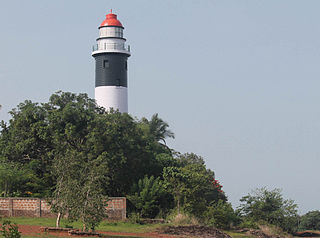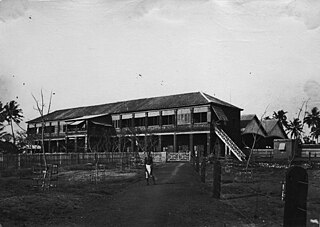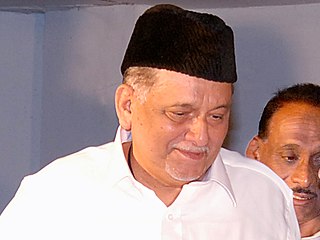Related Research Articles
A thalassocracy or thalattocracy, sometimes also maritime empire, is a state with primarily maritime realms, an empire at sea, or a seaborne empire. Traditional thalassocracies seldom dominate interiors, even in their home territories. Examples of this were the Phoenician states of Tyre, Sidon and Carthage; the Italian maritime republics of Venice and Genoa of the Mediterranean; the Chola dynasty of Tamil Nadu in India; the Omani Empire of Arabia; and the Austronesian empires of Srivijaya and Majapahit in Maritime Southeast Asia. Thalassocracies can thus be distinguished from traditional empires, where a state's territories, though possibly linked principally or solely by the sea lanes, generally extend into mainland interiors in a tellurocracy.

Mappila Muslim, generally in recent times, is a member of the Muslim community of same name found predominantly in Kerala and Lakshadweep Islands in Southern India, and historically used to identify Muslims from Northern Kerala. Muslims of Kerala make up 26.56% of the population of the state (2011), and as a religious group they are the second largest group after Hindus (54.73%). Mappilas share the common language of Malayalam with the other religious communities of Kerala.
Beypore or Beypur is an ancient port town and a locality town in Kozhikode district in the state of Kerala, India. It is located opposite to Chaliyam, the estuary where the river Chaliyar empties into Arabian Sea. Beypore is part of Kozhikode Municipal Corporation. The place was formerly known as Vaypura / Vadaparappanad and also as Beydary. Tippu Sultan, ruler of Mysore, named the town "Sultan Pattanam". There is a marina and a beach while Beypore port is one of the oldest ports in Kerala, which historically traded with the Middle East. Beypore is noted for building wooden ships, known as dhows or urus in the Malayalam language. These ships were usually bought by Arab merchants for trading and fishing but are now used as tourist ships. According to Captain Iwata, founder member of the Association of Sumerian ships in Japan, Sumerian ships might have been built in Beypore. There is evidence to prove that Beypore had direct trade links with Mesopotamia and was a prominent link on the maritime silk route. The first railway line of Kerala was laid in 1861 from Tirur to Beypore (Chaliyam) passing through Tanur, Parappanangadi, Vallikkunnu, and Kadalundi.

Ezhimala, a hill reaching a height of 286 metres (938 ft), is located near Payyanur, in Kannur district of Kerala, South India. It is a part of a conspicuous and isolated cluster of hills, forming a promontory, 38 km (24 mi) north of Kannur (Cannanore). The Indian Naval Academy at Ezhimala is Asia's largest, and the world's third-largest, naval academy.

Koyilandy is a major town municipality and a taluk in Kozhikode district, Kerala on the Malabar Coast. The historical town is located right in the middle of the coast of Kozhikode district, between Kozhikode (Calicut) and Kannur, on National Highway 66.

Islam arrived in Kerala, the Malayalam-speaking region in the south-western tip of India, through Middle Eastern merchants. The Indian coast has an ancient relation with West Asia and the Middle East, even during the pre-Islamic period.

The Cheraman Juma Mosque is a popular pilgrim centre in Kodungallur in Thrissur district. According to hagiographical legends, it is claimed that the mosque was built in 629 CE by Malik Bin Dinar.

Parappanangadi is a major town and a municipality in Tirurangadi taluk of Malappuram district, Kerala, India. It is a coastal town located close to the Arabian Sea.

Religion in Kerala is diverse. According to 2011 census of India figures, 54.73% of Kerala's population are Hindus, 26.56% are Muslims, 18.38% are Christians, and the remaining 0.33% follow other religions or have no religion. As of 2020, Hindus, Muslims, Christians and others account for 41.5%, 43.9%, 13.9% and 0.7% of the total child births in the state, respectively.

Mishkal Mosque is a medieval mosque located in Calicut on Malabar Coast, southern India. The mosque, one of the few surviving medieval mosques in Kerala, is regarded as an important cultural, historical and architectural monument of Kerala.
Puslan is a community-status group of Muslims in Kerala, south India. They were the traditional sea fishermen of the central Malabar Coast.
Parappanad was a former feudal city-state in Malabar, India. The headquarters of Parappanad Royal family was at the town Parappanangadi in present-day Malappuram district. In 1425, the country divided into Northern Parappanad and Southern Parappanad. Southern Parappanad included parts of Tirurangadi Taluk and the town Parappanangadi. Northern Parappanad included Panniyankara, Beypore, and Cheruvannur of Kozhikkode Taluk. Parappanad royal family is a cousin dynasty of the Travancore royal family.

Arakkal Kingdom was a Muslim kingdom in Kannur town in Kannur district, in the state of Kerala, South India. The king was called Ali Raja and the ruling queen was called Arakkal Beevi. Arakkal kingdom included little more than the Cannanore town and the southern Laccadive Islands, originally leased from the Kolattiri. They owed allegiance to the Kolattiri rulers, whose ministers they had been at one time. The rulers followed the Marumakkathayam system of matrilineal inheritance, a system that is unique to a section of Hindus of Kerala. Under Marumakkathayam, the succession passes to the male offspring of its female members, in other words from a man to his sister's son and so forth. As the only Muslim rulers in Malabar, they saw the rise of Hyder Ali, de facto ruler of the Mysore Sultanate as the opportunity to increase their own power at the expense of Chirakkal, and invited him to invade Kerala. Ali Raja Arakkal Sultan Afsal Ashraf living in Konni Panchayat of Pathanamthitta district is the living heir of the Arakkal dynasty.

Chaliyam is a village situated at the estuary of Chaliyar in Kozhikode district of Kerala, India. Chaliyam forms an island, bounded by the Chaliyar in the north, and River Kadalundi in south, and the Conolly Canal in the east. It is located just opposite to Beypore port. Chaliyam was the former terminus of the South-West Line of the Madras Railway. Chaliyam is also famous for the Guinness World Records holder Muhammed Adil, a P.M who covered around seven km in the Chaliyar River with his hand and legs tied with ropes.
Madayi Mosque is mosque at Pazhayangadi in Kannur district, northern Kerala, India. It is one of the oldest mosques in Kerala, with local legends dating back to the 7th century AD. It is believed to have been established by Malik ibn Dinar and contains a block of white marble said to have been brought from Mecca by ibn Dinar. It is one of the several mosques around Pazhayangadi/Payangadi. It is situated on the banks of Kuppam River, which joins Valapattanam River at its estuary.
Qissat Shakarwati Farmad is an Arabic manuscript of anonymous authorship. It is argued that the qissat is the oldest, most detailed, and comprehensive recorded version of the Cheraman Perumal legend.
Mukkuvar is a maritime ethnic group found in the Indian states of Kerala, Tamil Nadu and the Eastern and North Western coastal regions of Sri Lanka. They are mostly found on the Malabar Coast, South Travancore Coast and Kanyakumari district, Tamil Nadu, who have traditionally been involved in fishing and other maritime activities.

Pukkoya family of Panakkad is a Yemeni-origin sayyid (thangal) family based in present-day northern Kerala. The family, claiming descent from the family of Muhammad, is generally revered by the Sunni Shāfiʿī Kerala Muslims. The thangals are respected as religious and political leaders amongst the Muslims of Kerala.
Pius Malekandathil is an Indian historian and a priest of the Syro-Malabar Church. He is a professor at the Centre for Historical Studies, Jawaharlal Nehru University, New Delhi.
References
- 1 2 3 4 5 6 7 8 9 10 11 12 13 14 15 "Sebastian Prange (official profile)". University of British Columbia.
- 1 2 FPJ Web Desk. "Ramachandra Guha, fourth Indian to be awarded by American Historical Association". The Free Press Journal.
- ↑ "Monsoon Islam | South Asian history". Cambridge University Press. Retrieved 2020-06-27.
- ↑ "Pacific Coast Branch Book Award Recipients » Pacific Coast Branch of the American Historical Association". Pacific Coast Branch of the American Historical Association. Retrieved 2023-11-20.
- ↑ "John F. Richards Prize Recipients | AHA". www.historians.org. Retrieved 2023-11-20.